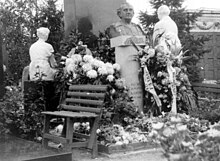|
Shmuel Halkin
Shmuel Zalmanovich Halkin (Yiddish: שמואל האַלקין; Belarusian: Самуіл Залманавіч Галкін, romanized: Samuil Zalmanavič Halkin; Russian: Самуил Залманович Галкин, romanized: Samuil Zalmanovich Galkin; December 5, 1897 – September 21, 1960), also known as Samuil Galkin, was a Soviet poet who wrote lyric poetry and translated many writers into Yiddish. BiographyHalkin was born in Rahachow, in what was then the Russian Empire (now Belarus) on December 5, 1897.[1][2][3] He was the youngest of nine children in a Hasidic, Jewish household and a cousin of Simon and Abraham Halkin.[4][5] Halkin was interested in Jewish culture as a child, later as a young man he would become interested in painting and literature before ultimately deciding to become a poet.[5][6] In his youth he wrote his poetry in Hebrew, but from 1921 onwards he wrote in Yiddish.[7] Halkin's first poems were published in 1917 in an anthology. He would then move to Moscow in 1922, after having lived in Kiyv for a year, where he published his debut collection Lider (Songs) with the help of David Hofstein.[6][8][9] This would not only be the foundation of his career, but part of the foundation of Soviet Jewish poetry.[10] These and his later works would earn his lyric poetry acclaim.[11][2] During World War II Halkin was a member of the Jewish Anti-Fascist Committee and served on the editorial board of its journal Eynikayt, during which he wrote about the Shoah.[1][8] Halkin would develop a cordial relationship with fellow committee member and neighbor Peretz Markish.[12] He was arrested in 1949 alongside other members of the committee but was spared execution alongside them in 1952, likely due to a heart attack he suffered while imprisoned that hospitalized him. He would go on to be released in 1955.[8][13] Along with his original works, Halkin was known for translating the poems of Pushkin, Yesenin, Blok, Mayakovsky, Shakespeare's tragedy King Lear into Yiddish.[1][8] The last of which was directed by Sergei Radlov and produced at the Moscow State Jewish Theatre.[14] Halkin supported zionism, and would be criticized for his advocacy of Jewish nationalism.[9] Halkin died in Moscow, Soviet Union on September 21, 1960, on the second day of Rosh Hashanah.[1][15] He was buried in Novodevichy Cemetery. Following his death more of Halkin's works would be posthumously released, notably his work on the chorus of Mieczysław Weinberg's sixth symphony.[16] Musical settings
References
|
||||||||||||||||||
Portal di Ensiklopedia Dunia
